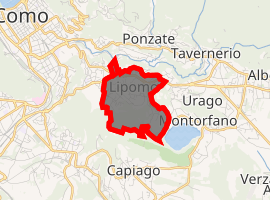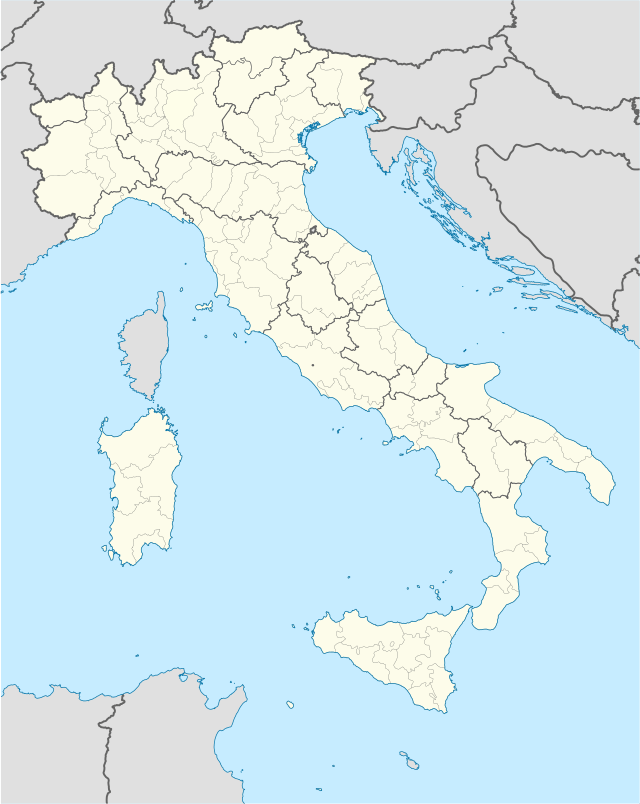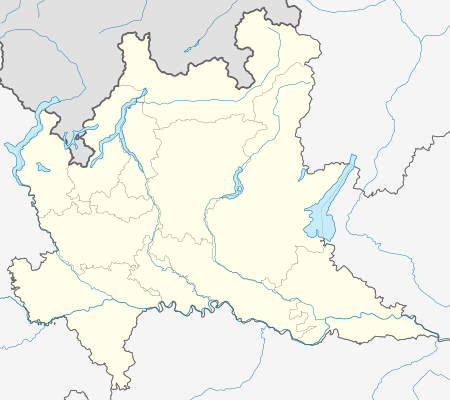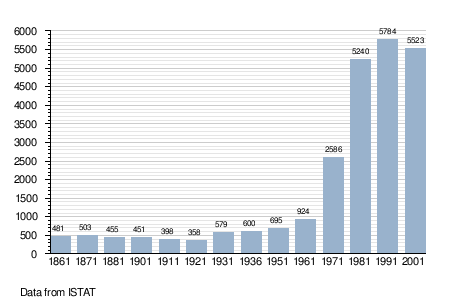Lipomo
Lipomo (Brianzöö: Lipòmm [liˈpɔm]) is a comune (municipality) in the Province of Como in the Italian region Lombardy, located about 35 kilometres (22 mi) north of Milan and about 3 kilometres (2 mi) southeast of Como. As of 31 December 2004, it had a population of 5,758 and an area of 2.5 square kilometres (0.97 sq mi).[3]
Lipomo | |
|---|---|
| Comune di Lipomo | |
Location of Lipomo 
| |
 Lipomo Location of Lipomo in Italy  Lipomo Lipomo (Lombardy) | |
| Coordinates: 45°48′N 9°7′E | |
| Country | Italy |
| Region | Lombardy |
| Province | Province of Como (CO) |
| Area | |
| • Total | 2.5 km2 (1.0 sq mi) |
| Elevation | 384 m (1,260 ft) |
| Population (Dec. 2004)[2] | |
| • Total | 5,758 |
| • Density | 2,300/km2 (6,000/sq mi) |
| Demonym(s) | Lipomesi |
| Time zone | UTC+1 (CET) |
| • Summer (DST) | UTC+2 (CEST) |
| Postal code | 22030 |
| Dialing code | 031 |
| Website | Official website |
Lipomo borders the following municipalities: Capiago Intimiano, Como, Montorfano, Tavernerio.
History
A forerunner of modern-day Lipomo was presumably founded in Roman times, at the time when Julius Caesar conquered Como. For all the imperial era Lipomo, given its proximity to Como and on a hill, Lipomo may have been a shelter from the invasions of barbaric populations coming from the Lario area.
In the Middle Ages, Lipomo was a small village which was attacked and almost completely destroyed by the inhabitants of nearby Cantù in 1050, a battle which took place in the context of the disputes between the major local powers of Como and Milan. When in 1535 the Duchy of Milan fell under Spanish domination, Lipomo - like all the villages of the Pieve di Zezio in North Lombardy - followed the same fate; in 1656 the commune freed itself from feudal subjection by paying a duty based on the number of families present in the area. That was a decision of the Spanish government which, in search of new funds to replenish the always troubled state coffers, in 1647 had decided to sell certain areas as a fiefdom to a family of the Milanese and Spanish aristocracy, leaving the centers included in the area itself the possibility of redeeming themselves against the payment of money. However, Lipomo later entered under the domain of the De Herra family, of distant Spanish ancestry, who - until early XX century - owned a vast part of the agricultural land and real estate assets of Lipomo. When Napoleon I conquered Lombardy, Lipomo was aggregated to the XXII district of Como, while with the advent of the Cisalpine Republic it moved into the District I of Como. Following the coronation of Napoleon as Emperor on March 6, 1805, Lipomo was then included in the Canton II of Como, incorporated into the afore-mentioned District I of Como and becoming a suburb of Como. Some members of the Lipomo growing middle-class took part in the Italian Wars of Independence (1860) and to World War I. After World War II, which left the community particularly impoverished, in 1946, the De Herra family and their latest heirs belonging to the Melano di Portula and Tanzi families, sold all the remaining real estate and agricultural properties. A rapid and turbulent industrial development took place with a consequent demographic increase, particularly in the textile and mechanic industry.
Demographic evolution

References
- "Superficie di Comuni Province e Regioni italiane al 9 ottobre 2011". Istat. Retrieved 16 March 2019.
- "Popolazione Residente al 1° Gennaio 2018". Istat. Retrieved 16 March 2019.
- All demographics and other statistics: Italian statistical institute Istat.